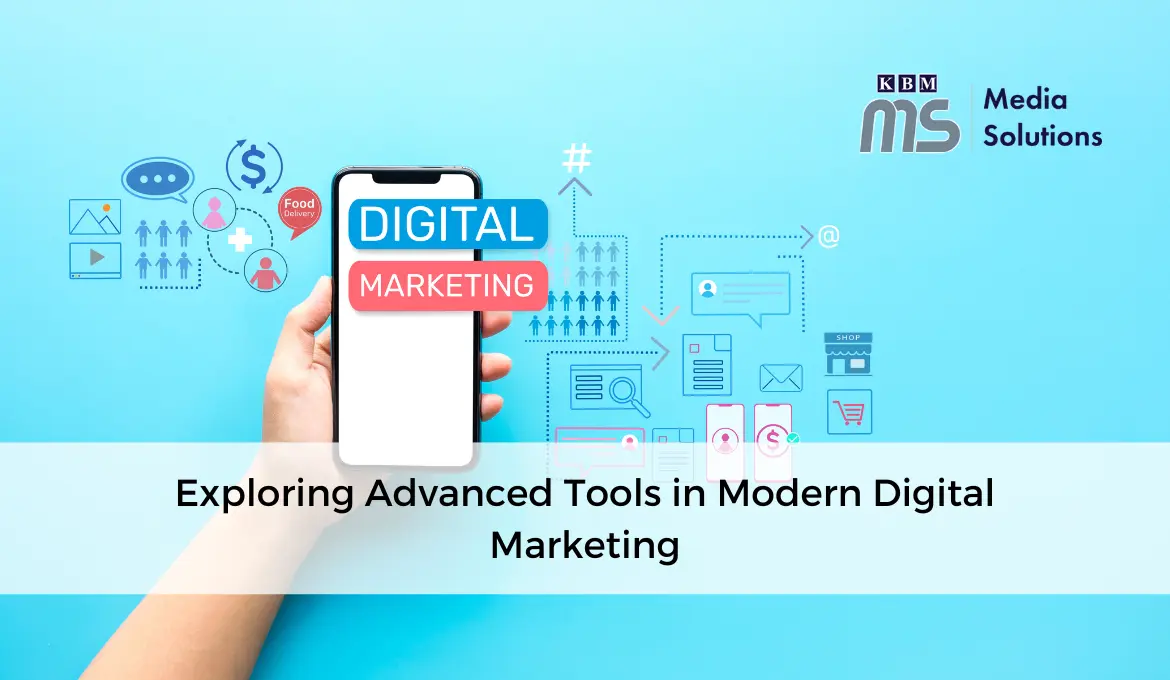Exploring Advanced Tools in Modern Digital Marketing

Posted on Jun 05, 2024
Digital marketing is a realm of constant evolution, with new solutions and technologies emerging at a rapid pace. As marketers, we have the power to embrace these advancements and leverage them to create effective campaigns, staying ahead of the race.
This article is a guide to mastering some of the most exciting advanced tools transforming modern digital marketing, empowering you to navigate this dynamic landscape with confidence.
Artificial Intelligence (AI)
AI, the most transformative force in digital marketing today, offers a multitude of benefits. AI is a game-changer, from predictive analytics that identifies customer trends to machine learning algorithms that optimise ad targeting.
It helps marketers personalise experiences, automate tasks, and gain deeper insights into their audience, enhancing the effectiveness of their campaigns.
- Uses: AI-powered chatbots can handle customer service inquiries, while sentiment analysis tools can gauge audience reaction to campaigns.
Marketing Automation
Repetitive tasks, including email marketing and social media scheduling, can be automated, freeing up valuable time for strategic planning. Marketers can use automation platforms to create personalised customer journeys and nurture leads efficiently.
- Uses: Automated email sequences can be triggered based on customer behaviour, while social media posts can be scheduled weeks in advance.
Customer Relationship Management (CRM) Systems
CRMs consolidate customer data from various sources, offering a holistic view of each customer interaction. This empowers marketers to personalise content, offers, and communication for a more meaningful engagement.
- Uses: CRMs can track customer purchase history and preferences, allowing for targeted product recommendations and loyalty programs.
Programmatic Advertising
This technology automates the selling and buying of ad space across various websites and platforms. Marketers can set specific targeting parameters and leverage real-time bidding to reach their ideal audience more efficiently.
- Uses: Programmatic advertising allows precise targeting based on demographics, interests, and online behaviour.
Content Marketing Platforms
These platforms streamline content development, making it easier for marketers to plan, develop, and publish content across various channels. They offer features like content calendars, collaboration tools, and analytics dashboards.
- Uses: Marketers can use these platforms to create infographics, blog posts, and social media content, all in one place. They can also track content performance and measure ROI.
Advanced Tools for Specific Needs
Beyond these foundational tools, a treasure trove of specialised options caters to distinct marketing goals:
- Social Listening Platforms: Track brand mentions, analyse audience sentiment, and identify influencer opportunities.
- Marketing Attribution Tools: Measure the impact of each marketing touchpoint on the customer journey, allowing for data-driven budget allocation.
- Customer Data Platforms (CDPs): These platforms integrate data from various sources to create a unified customer profile, enabling hyper-personalisation across channels.
- Augmented Reality (AR) and Virtual Reality (VR): Develop immersive brand experiences that foster deeper customer engagement.
The Rise of the Marketing Technologist
The growing complexity of these tools necessitates the emergence of a new breed of marketer: the marketing technologist. These professionals, with their unique blend of marketing expertise and data analysis skills, are the key to unlocking the full potential of advanced tools.
They can effectively leverage these tools and translate data insights into actionable marketing strategies, driving better results.
The Importance of a Data-Driven Approach
Advanced marketing tools generate vast amounts of data. To fully harness their power, marketers must adopt a data-driven approach. This involves setting clear goals, collecting relevant data, examining it effectively, and using the insights to optimise campaigns for better results.
A data-driven approach is not just a strategy, it's a necessity in the era of advanced marketing tools.
The Future of Advanced Tools: Embracing Experimentation
The future of marketing is a canvas for continuous innovation and creativity. A/B testing allows us to compare different versions of campaigns and identify the most effective strategies.
We can also leverage advanced analytics to measure the impact of new technologies like voice search and personalisation on customer behaviour, inspiring us to push the boundaries of what's possible in marketing.
Building a Sustainable Marketing Tech Stack
With so many options available, developing a marketing tech stack that aligns with your specific needs and budget is crucial. Focus on integrating tools that seamlessly work together and avoid the temptation to adopt every shiny new tool.
Regularly evaluate your tech stack and adjust as needed to ensure optimal performance.
The Human Touch Endures
While advanced tools are vital, the human touch remains the heart and soul of marketing. Our creativity, storytelling, and emotional intelligence are what build genuine connections with customers.
We must leverage technology to augment our human skills and deliver impactful marketing experiences, reminding us of our unique value in this digital age.
Conclusion
The digital marketing world is dynamic and constantly evolving. By embracing advanced tools, adopting a data-driven mindset, prioritising experimentation, and fostering human connection, marketers can stay ahead of the game and achieve their marketing goals in this exciting new era.
The key lies in striking the right balance between leveraging cutting-edge technology and retaining the human touch that fosters genuine customer relationships.